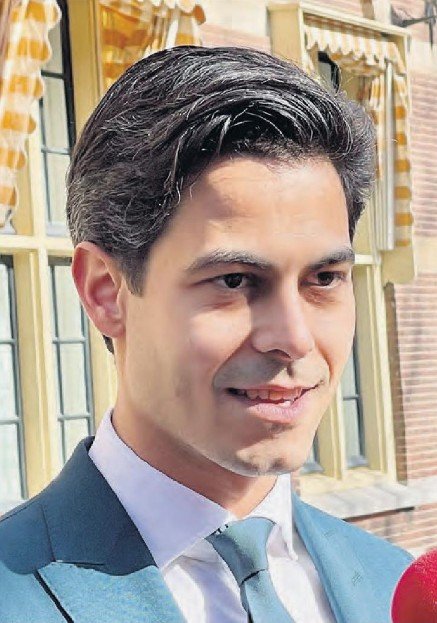As part of the ambition of the new Dutch government to be a showcase with the Dutch Kingdom for the sustainability of small island states, Dutch Minister for Climate and Energy Rob Jetten wants to work on renewable energy together with the Dutch Caribbean.
Becoming a showcase requires solid collaboration between the Dutch government departments, the public entities Bonaire, St. Eustatius and Saba, and the countries Aruba, Curacao and St. Maarten, stated Minister Jetten in a letter he sent to the Second Chamber of the Dutch Parliament last week.

In the letter, the minister stated he would “gladly contribute” to accomplishing this. He acknowledged that while the six islands were “each unique and different,” they all faced similar issues where it came to energy and climate.
According to the minister, it concerned the sustain-ability of electricity production, sustainable ways to cool buildings, a safe drinking water system and more self-reliance in food production.
“The right approach to these issues is not only important in the interest of the climate, but also offers opportunities to improve the quality of life, to reduce the cost of utilities and to make the economies greener,” he stated.
Enhancing the sustain-ability of the kingdom and bringing the energy policies of the partners in the kingdom in line with the goals of the Paris Climate Accord is a shared responsibility of the Netherlands and the Dutch Caribbean countries, Jetten noted.
In the coalition agreement, the new Dutch government committed to assist the Dutch Caribbean countries to enhance sustainability and strengthen the island economies. For this purpose, the Subsidy Regulation Sustainable Energy, the SDE++ regulation, will become available for Aruba, Curacao and St. Maarten.
The countries will also acquire access to funds such as InvestNL, the Growth Fund and the Climate Fund for which the Dutch government is setting aside large sums. “My ministry is willing to think along with the ambitions of the countries in the area of reduction of fossil [carbon dioxide — Ed.] CO2 emissions and to facilitate this where possible,” stated Jetten.
“We form one kingdom in which the countries assist each other if an autonomous country cannot solve the issues, problems or challenges on its own. Mutual assistance in the climate and energy policy is now needed,” the minister wrote in his letter.
“As stated in the coalition agreement, the SDE+ + will become accessible for the autonomous countries. The objective of this primarily is to enhance sustainability, not to reduce the electricity tariffs.”
Jetten said the Dutch government was preparing to open up the SDE+ + regulation for the Dutch Caribbean and that he aimed to inform the Second Chamber on the “best way to support sustainability in the countries” at the start of the new parliamentary year, which is in September.
As for the Caribbean Netherlands, the three smaller islands for which the Netherlands is responsible, Jetten stated that in Bonaire “big steps” were being taken to make the production of electricity more sustainable through wind turbines.
Two large investments will be made in Bonaire in the near future. In the first phase, a solar park will be constructed and in phase two, more wind turbines will be built, in combination with battery storage and special electronics.
Jetten announced that he would be working with the public entities St. Eustatius and Saba, together with the local utility companies STUCO and Saba Electric Company (SEC) respectively, to execute existing plans for renewable energy. Both islands already have large solar parks.
St. Eustatius has opted to expand the solar parks with a third phase of 2.4 megawatts (MW) and a large amount (10MW-hours) of extra battery storage. This would increase the overall share of sustainable energy to at least 52 per cent over 24 hours.
The third phase of Statia’s solar park has been budgeted at US $7.85 million and could be operational in a year. St. Eustatius will need funding for this project. Jetten stated that he was willing to talk with the public entity St. Eustatius and utilities company STUCO about financial support.
The public entity Saba, SEC and the Ministry of Economic Affairs and Climate have, “in constructive consultation,” developed joint plans for enhancing sustainability in Saba through wind energy and battery storage.
“In Saba, one middle-large landside wind turbine of 4.2MW with battery storage will be sufficient for an increase of renewable energy of the current 40 per cent per 24 hours to more than 90 per cent sustainable electricity,” stated Jetten.
This significant step in enhancing sustainability would result in 100 per cent of electricity being generated in a sustainable manner on the regular sunny and windy days. The diesel generators will remain on standby for days when there is no sun or wind. The cost of this project has been set at US $11-13 million. Financial support will be discussed with the public entity Saba and SEC.
The Daily Herald.

 Saba News News and Information from Saba Island, Dutch Caribbean
Saba News News and Information from Saba Island, Dutch Caribbean
